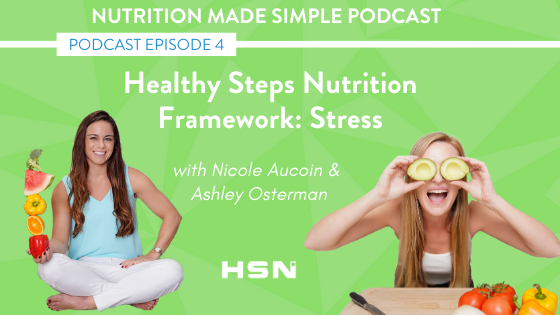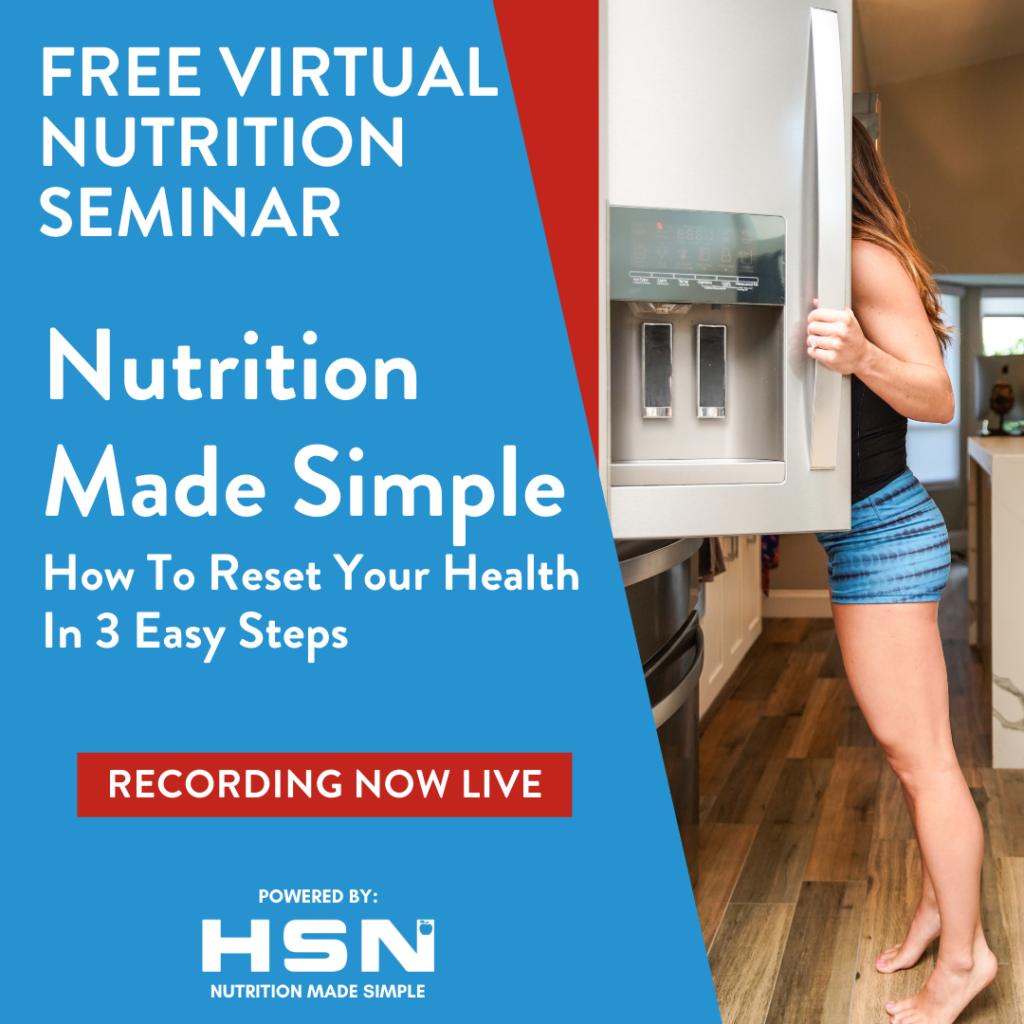Today, Nicole Aucoin and Ashley Osterman discuss the third pillar of the Healthy Steps Nutrition Framework: Stress Management & Mindset.
A positive mindset and finding how you manage stress best is vital to creating a healthy lifestyle. We all deal with stress; listen to this episode to find how to practice positive stress management instead of turning to your pantry to manage stress.
Our mission is to empower 4k people in January to ditch the all or nothing mentality and take control of their health one step by listening to this podcast.
Do you know someone who is looking to lose weight? We would love for you to share this podcast with them! You never know who could use some words of encouragement — take a screenshot, post it on social media, and tag @healthystepsnutrition so your friends can find this awesome free help! Also, don’t forget to subscribe to listen to every episode!
PODCAST EPISODES TO LISTEN TO ON THE ADDITIONAL PILLARS OF THE HEALTHY STEPS NUTRITION FRAMEWORK
Episode Transcript:
Nicole Aucoin (00:03):
Welcome back to the Nutrition Made Simple Podcast.
Nicole Aucoin (00:07):
At Healthy Steps Nutrition, we believe something as fundamental as nutrition shouldn’t be complicated which is why we focus on a simple, habit-based approach when working with clients. We have helped over 30,000 people around the world take control of their health through our simple habit-based approach.
Nicole Aucoin (00:25):
I’m your host, Nicole Aucoin, Registered Dietitian and Founder of Healthy Steps Nutrition, CrossFit HSN, and HSN Mentoring. I’m also the author of the Healthy Kids Cookbook: 100% ‘Kid- Approved’ Recipes For The Whole Family. You can buy that on Amazon.
Nicole Aucoin (00:43):
In this brand new podcast, we will be teaching you how to take one step at a time to become the healthiest version of yourself. Today, Ashley and I talk about the third pillar of the Healthy Steps Nutrition framework: stress management and mindset.
Nicole Aucoin (01:01):
A mindset is a way of thinking, a belief that influences how you feel about yourself, others, and the world in general. Your beliefs determine your behavior and drive your attitude towards people and situations. Every action that you take impacts your future, whether you believe it or not. It’s daily actions that lead to habits, and those habits create your lifestyle, healthy or not.
Nicole Aucoin (01:32):
So let’s unpack mindset first. Do you see the glass half full or half empty? It’s easy during stressful seasons like this year or last year to see the glass half empty. In fact, it’s easier to see the glass half empty when everyone else around you sees it the same way. Instead, we have to be intentional about finding the bright spots. We have to find the positive instead of finding the negative, and sometimes it’s easier said than done.
Nicole Aucoin (02:08):
Let me give you an example with weight loss. Let’s say you’re trying to lose weight. It’s been about two weeks, and you’re not seeing the numbers move on the scale as fast as you would like. If your mindset becomes, “This doesn’t work. This isn’t going to work for me,” it’s too easy to just give up. Instead, you must find things that are going well. Looking for non-scale victories, things like how are you sleeping? How are your energy levels? How are your clothes fitting? What about your mood and your recovery? There are so many things that could be positively impacted by you eating well, so find the bright spots.
Nicole Aucoin (02:48):
All right. Now let’s talk about stress management. I think we have all been there. Stressed and somehow we find our way to the freezer or the pantry. That instant gratification of insert your guilty pleasure doesn’t actually help you manage that stress for the long time. It gives you that dopamine high, but then dopamine comes crashing down, and you don’t feel great after.
Nicole Aucoin (03:15):
In this episode, Ashley and I unpack how to manage stress without turning to food. We will get to this episode right after this message.
Nicole Aucoin (03:28):
Our mission at Healthy Steps Nutrition is to empower 4,000 people in the month of January to ditch that all or nothing mentality and take control of their health one step at a time by listening to this podcast. Do you know someone who’s looking to lose weight? We would love for you to share this podcast with them. You never know who could use some words of encouragement. Take a screenshot, post it on your social media, and tag #HealthyStepsNutrition so your friends can find this awesome free help.
Nicole Aucoin (04:02):
One last thing, don’t forget to subscribe to this podcast.
Nicole Aucoin (04:10):
Ashley Osterman, welcome back to the Nutrition Made Simple Podcast.
Ashley Osterman (04:15):
Thank you so much for having me, Nicole.
Nicole Aucoin (04:18):
Last week we talked about support system. The week before we talked about nutrition. And this week, we’re talking about the third pillar in the Healthy Steps Nutrition framework which is stress management.
Ashley Osterman (04:29):
And I mean, all of us deal with stress. What is stress? Stress is an emotional and a physical response to demanding situations. But when we’re looking at stress, what’s most important is how we manage it. For every person, it’s a little bit different, right?
Nicole Aucoin (04:51):
Right.
Ashley Osterman (04:51):
And there are seasons where it might be a little bit more stressful than others. I think this year has been a stressful season.
Nicole Aucoin (05:00):
Absolutely, there is. And I think when we work with our nutrition clients, one of the main things that we need to establish is how they are mindfully managing stressful times. Because sometimes we find that people manage stress in unproductive ways. So many people use food as comfort in a way to manage stress. They go right to the cabinet or the freezer and grab something, and that is something we have to help a lot of clients overcome.
Ashley Osterman (05:35):
Absolutely because you’re stressed out, you’re emotional, probably tired, angry, sad, whatever it might be, and you’re looking for that instant gratification which as we know, we eat food. We do get that instant gratification, that instant high, as you can say. But it goes away. And when we’re coping with food, we’re not getting to the root of the problem, and that is what we can do by practicing mindful stress management.
Nicole Aucoin (06:06):
I think the first thing we need to focus on is focusing on what you can control. How can you actively do something to help the situation? If it’s out of your control, there’s nothing you can do. There’s no point to being super stressed about it because there’s literally nothing you can do.
Nicole Aucoin (06:22):
But if we look at what can you actively do to help manage that stress, it’s a really important piece of the puzzle. We like to help clients navigate some positive ways to manage stress.
Ashley Osterman (06:33):
Absolutely. And when practicing mindfulness when presented with stressors, it really gives us an alternative way to process and handle what’s happening, even if it is out of our control.
Ashley Osterman (06:47):
One of the things that we like to do is identify your social support. Who can be there to talk with you when you’re having problems? Who can you share your problems with? The research shows that your brain releases hormones when you talk and share your problems with others that actually help lessen the undesirable effects of stress.
Nicole Aucoin (07:10):
Mental health is something that a lot of people don’t like to talk about or don’t talk to anyone like a counselor, mental health counselor. I personally have a mental health counselor. I think it is so important to talk about these things. Everyone has things that they’re dealing with, and what happens is if you don’t actually deal with those things, it ends up piling up and getting worse and worse over time.
Ashley Osterman (07:32):
Absolutely. Emotional needs are so important when it comes to stress management and your mental health. Stress can trigger many emotions, but it’s important to not ignore those feelings, right, which is what we do when we binge eat or deal with it in an unproductive way. Emotional management isn’t about necessarily eliminating the stress or eliminating the emotions, but rather than how to deal with them in a healthy way.
Ashley Osterman (07:59):
So take a minute and think about it. What is one way that you might have successfully handled a stress related event or emotion in the past? Go back to what has worked with you before.
Nicole Aucoin (08:12):
For a lot of people exercise is the way that they manage stress. I know for me, it is definitely the way that I manage stress. For a lot of our people at our gym, it is the way they manage stress. You release endorphins when you work out. You feel better, and it helps you manage stress.
Ashley Osterman (08:32):
Absolutely. Another great way for managing stress could be reflective journaling, taking the time to write out your feelings, write out what’s stressing you. Think about how you could better put that stress into words to release it. That’s a really great tip for somebody out there who’s having a hard time manage stress. Write it down. Write it all out. Get it out. If you’re not able to talk to somebody, reflective journaling might be a great way for you to mindfully manage the stress that you’re presented with.
Nicole Aucoin (09:04):
The other thing is talking to someone, talking to a friend, talking it out, and just as you were saying before, when we talk through things, it oftentimes makes us feel a little bit better.
Ashley Osterman (09:14):
It lessens those undesirable effects of stress.
Nicole Aucoin (09:18):
Another great option is to practice parasympathetic activities. And what I’m talking about there is meditation, deep breathing, or yoga. That can be a great way to lessen your stress and clear your head.
Ashley Osterman (09:34):
So prolonged stress can actually hurt your immune system and impede your ability to achieve your goals. Cortisol levels, small bursts of cortisol which is your stress hormone is okay. Totally fine. But extended periods of elevated cortisol levels can cause more damage than good.
Nicole Aucoin (09:57):
It’s not good for you which is so important why you think about how you can mindfully manage your stress.
Ashley Osterman (10:04):
When we work with our nutrition clients, we look at stress. Sometimes a great way to help you when presented with stressors is to remember to stop. And when I say stop, it’s actually a practice of stopping to be mindful when managing your stress. So I encourage you listeners, next time when a stressor has triggered you, and you are just about to react to that stress, take a moment, slow down, and follow these four steps.
Ashley Osterman (10:34):
S is of course for slow down, we need to just not react without stopping and taking a breath which is the T.
Ashley Osterman (10:43):
Next I want you to observe. What are you feeling? What are you thinking? Now take a moment to think what other possibilities exist.
Ashley Osterman (10:53):
And finally P, proceed. Proceed considering multiple possibilities.
Ashley Osterman (11:00):
And my favorite example for this is actually one that I do quite often. You guys ever been driving and somebody cuts you off or runs a light or you get in a situation where somebody is just being very neglectful on their driving skills. Do you ever get mad and want to scream or shout or do some gesture? Take a moment and practice stopping. Slow down, and I mean this both figuratively and literally. Don’t speed. Slow down. Take a breath. Take a moment. Deep breath in, let it out. Now observe. What’s going on? I’m driving. I need to be mindful of my environment and reacting that way might not be the safest for me and whoever’s in my car. Then I’m going to proceed. I’m going to proceed thinking about other different possibilities. So instead of reacting negatively, I’m just going to be grateful that that person didn’t have some type of negative consequence or create an accident.
Ashley Osterman (11:58):
So just by taking a moment to think through the situation, I’m not going to react as I would have before when encountered with that stressor.
Nicole Aucoin (12:06):
And that’s a really good example. And down here in South Florida, there are some really great drivers around town, and we probably would have to practice that more often than not.
Nicole Aucoin (12:17):
So having this mindset when dealing with stress is really important. And we talk a lot about mindset at Healthy Steps Nutrition and starting off with gratitude, starting your day off with gratitude, having that positive mindset because when you see things negatively, all of a sudden you see more negative things. But when you see things positively or you look on the bright side of things, you see more things on the bright side.
Ashley Osterman (12:46):
Absolutely. This is so true. You have that situation. You’re thinking about buying a new car, let’s say a Jeep. I’m going to buy a Jeep. I’m in the future. You’ll all of a sudden see a lot of Jeeps on the road. It really does work. Whatever you keep forefront in your mind and you’re thinking about is what you’re going to see. And we know that positivity breeds positivity. And to start with that mindset of gratitude and a positive outlook is really going to shape your day. And when you do come into contact with stress, as we all will, it’s a normal part of life, you might step back and take a moment to listen and think about how you can manage that stress mindfully and in a positive light.
Nicole Aucoin (13:30):
Absolutely. You have to have a positive outlook or else you are going to find something wrong with everything.
Ashley Osterman (13:37):
Absolutely. And then you are going to be miserable. No one wants to be miserable. No one wants to be miserable. So we have to find that positive… I mean, we’re talking about positive relationship with food. We have to find the bright spot in everything. We have to find those positive things.
Ashley Osterman (13:51):
So a lot of times that means being intentional, right? Ending your day, what is something I’m thankful for today? And that is one thing you could take away from this episode. We, of course, want you to figure out how you manage stress beyond eating, right? We need a positive way to manage stress. But the other thing is start asking yourself at the end of every work day, or when you sit down and eat dinner with your family, what is the best thing, or what’s one thing you’re thankful for today.
Nicole Aucoin (14:18):
I love that. One thing that my grandma used to tell me, she would say, “You know what a characteristic of a successful person is?” She would say, “They celebrate more than they have sadness from the loses.” So they celebrate the wins more than they’re upset about the loses. And that’s what I want you guys to remember too. Celebrate those wins. Really focus on those bright spots in your life. When you focus on those bright spots, those wins, those successes, you’re going to see more of that.
Ashley Osterman (14:49):
Absolutely. So we have to talk about stress management. Stress management is such an important piece of the puzzle when you look at a holistic approach.
Nicole Aucoin (14:57):
And this is why it’s one of our pillars in the HSN framework which we are talking about in these podcast episodes.
Nicole Aucoin (15:05):
Next week, we’re going to be talking about sleep. And sleep and stress actually go hand in hand.
Ashley Osterman (15:11):
That they do.
Nicole Aucoin (15:12):
And if you don’t sleep enough, you are going to be more stressed.
Ashley Osterman (15:17):
That is true.
Nicole Aucoin (15:18):
So tune in next week when we talk all about sleep and what you can do to help improve your sleep to live a healthier life.
Nicole Aucoin (15:34):
Stress management is vital to creating a healthy lifestyle. Stress is unavoidable. How do you manage stress? Do you manage it in a productive way? Take a minute today to think.






